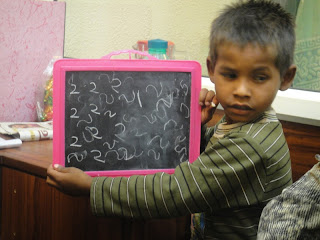
I want to talk about my experience as a volunteer in India with Ek Koshish, One Attempt. Being here has been one of the most memorable and wonderful experiences in my life: Not only am I volunteering, giving back to the desperately needy community here in Faridabad, but I am also learning so much about Indian culture and Hinduism. Working as a volunteer has been an incredible way to learn and improve my Hindi; should anyone be interested in learning this beautiful language, I can guarantee that working with "Ek Koshish, One Attempt" would undoubtedly accelerate anyone's understanding of Hindi or even Indian traditions. The Ek Koshish team is superb, as they truly care about the projects they run and the people to whom they reach out.
For example, this picture, taken during yesterday's lesson, depicts the many kindnesses of the people who run this NGO: The clothes that our student Vicky is wearing, were recently donated to him by the Ek Koshish staff, because he lacked proper clothing. The team at Ek Koshish also purchased all of their school supplies, donated all of their time to tutoring this student and his family and neighbors, and even offered their own home as a classroom for yesterday's lesson: Because of the unbearable heat, the head of Ek Koshish insisted that the children study in his home comfortably, with the luxury of air conditioning. When I was overhearing other locals' reactions to our work here, they had very negative feedback about inviting such children into one's home. I suppose they don't mind these children coming to work in their houses, but they cannot consider the children enjoying a birthday party or learning to read and write in their own homes. At least it's nice to see that the people who run Ek Koshish's NGO do not have this attitude, not even in the slightest!
As a final note, I want to emphasize that volunteering with Ek Koshish is essentially a free trip to India with volunteering arrangements ready for anyone. Of course, there is a very minimal fee for housing, but this is not incumbent upon anyone: If you want to just come and visit Ek Koshish for a day, you are more than welcome to do so; if you know anyone living in Faridabad, you can stay with them and volunteer for free. Otherwise, the very minimal living expenses here in India would be around $150 USD for one month of room and board, use of utilities, and three meals daily, all included. Though funds are very tight with Ek Koshish, they do not have any interest in charging volunteers to work and help the community. I highly recommend this experience, not only to those readers out there who are my friends and family, but to anyone interested in this sincerely altruistic cause!
























